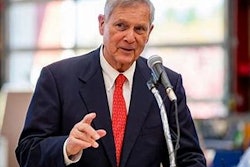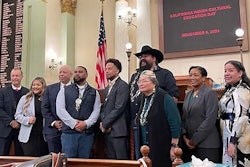In his 2004 address to the Democratic National Convention, Illinois State Senator Barack Obama remarked:
Now even as we speak, there are those who are preparing to divide us, the spin masters and negative ad peddlers who embrace the politics of anything goes. Well, I say to them tonight, there’s not a liberal America and a conservative America; there’s the United States of America. There’s not a Black America and White America and Latin America and Asian America; there’s the United States of America.
Obama was wrong. America isn’t divided by pundits and peddlers. It isn’t divided by vacuous political labels that tell us little about people’s commitment to mutual progress. Our country is divided because of a fundamental failure to embrace a most basic sense of common humanity that has long fueled public policy, law and practice. That failure is reflected in the continued rejection of people who look differently, come from different places of origin, worship differently and love differently. We are divided because promoting the politics of exclusion is as American as apple pie.
The vision of the U.S. as the great melting pot (or salad bowl) has always been aspirational, hampered at times by competing visions of progress. The unique brand of American Democracy — what Alexis de Tocqueville called “American Exceptionalism” — has been contested since the founding of this nation.
As Thomas Jefferson penned the words “we hold these truths to be self-evident that all men are created equal,” he enslaved nearly 200 Africans, including his wife’s half-sister, Sally Hemings. Hemings birthed at least six children who, by Virginia law, remained enslaved and thus ineligible to inherit the land, property and freedom of their father. And now, as Jefferson’s Monticello comes to grips with this complicated and contentious history, the United States stands at a similar crossroads of deciding whether to live up to her promise.
The rejection of difference is reflected in the Supreme Court’s 1884 decision that John Elk and other American Indians weren’t entitled to birthright citizenship in the United States. A ruling that set in motion a perpetual debate over tribal sovereignty and respect for ancestral land at places like Standing Rock. Even after the passage of the Indian Citizenship Act of 1924, access to the rights, privileges and responsibilities of American citizenship were constrained by state law and practice. And now, some 134 years later, lawmakers ponder rescinding birthright citizenship out of fear that the browning of America threatens to undermine the political status quo.
A fear of difference fueled the adoption of the 1882 Chinese Exclusion Act. The first time in history that the U.S. adopted an immigration measure that specifically barred a path to citizenship based on country of origin. Although Chinese workers had been recruited to the United States to work on railroads and, in turn, bolster American wealth, fears over “racial purity” sparked demands for a legislative response. Legislators blamed Chinese workers for the country’s economic decline despite the reality that the workers labored in dangerous, low-wage positions without the protections enjoyed by other workers. The past is prologue.
Our collective failure to respect difference means that Lance Corporal Jose Gutierrez will be remembered as a patriot in death, though thought a criminal in life. Gutierrez fled poverty and violence in his home country of Guatemala at the age of 16. Illegally crossing into the United States and eventually earning a green card, he joined the U.S. Marines hoping to better his life and create a future in his adopted country. He died in battle in Iraq fighting for a country unwilling to fight for him and others like him. As the great James Baldwin once wrote, “I love America more than any other country in this world, and, exactly for this reason, I insist on the right to criticize her perpetually.” Critique doesn’t make us unpatriotic, but acquiescence to the unconscionable does.
Recent Supreme Court decisions on issues like gerrymandering and voting rights coupled with raging debates over the U.S.’s departure from the United Nations Human Rights Council unfold as new information emerges that nearly 5,000 people have died on the island of Puerto Rico. On the brink of the start of hurricane season, housing vouchers are set to expire for thousands of families who fled to the mainland after Hurricane Maria.
As all 435 members of the U.S. Congress up for re-election scramble to weigh their electoral aspirations against current realities, President Trump has signed a new executive order to discontinue the practice of separating immigrant families at the border. It’s hard to grasp how a president could discontinue a practice whose existence had been soundly denied by the Secretary of Homeland Security just days before. Even the strength of that order rings hollow without a coherent strategy for reuniting children previously separated or for detailing how new families will be detained together. Images of undocumented children being held in makeshift detention camps still seem inadequate to push past partisanship and focus on human decency. Decency. A standard that isn’t beholden by party but remains elusive in a political climate where civility is a disappearing value.
As debates rage over the separation and treatment of children at the southern border, we are reminded, as my Virginia grandmother would say, “this ain’t new.” We have long known the generational damage wrought by separating children from their families. We hear it in the narratives of formerly enslaved Africans who detailed the pain of losing their children to the capitalistic greed of chattel slavery. Oral history archives highlight families separated as they tried to escape the violence and degradation that kept them in bondage in the South. The same sort of violence and fear that now drive families from across the Americas and Africa to seek refuge in a country they know will be hostile to their presence. Often fleeing political instability shaped by American foreign policy. We hear this generational damage through the voices of girls and young women once kidnapped in Nigeria by Boko Haram now seeking to reunite with families they can’t locate. We know the generational consequences of the United States holding the unique distinction of locking up more people, per incident, than any other country in the world. With more than 2.5 million people behind bars, more than 5 million children in this country have at least one incarcerated parent. A reality that leads to higher rates of depression, learning disabilities and vulnerability to violence for children separated from their families by the state.
This current political moment is a litmus test for our collective commitment to the values of justice, fairness and truth. A test that reveals the battle for the conscience of this country is as American as apple pie.
Dr. Khalilah L. Brown-Dean is an associate professor of Political Science at Quinnipiac University, where she writes about American Politics, political psychology, and public policy. You can follow her on Twitter @KBDPHD.




















